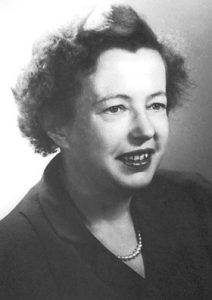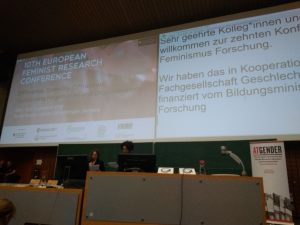Aleida Lujan Pinelo
The meeting point for the tour “Science with charm: women write history” is the Gänseliesel fountain, just at the heart of the medieval city. The tour guide explains us, why the goose girl statue has become the most kissed girl, at least in Germany. This is because just after defending successfully a doctorate exam, students in Göttingen climb the fountain, leave a bouquet of flowers, and finally they kiss the statue of the girl. The tour aims to make the audience understand how the life of women in ancient Göttingen was. To have a feeling of this; we are brought to different buildings, spaces that invite us to open our imagination and try to experience a time traveling to the past.

Picture: Dorothea Schlözer, Wikipedia
Among many stories discovered in this tour, I bring up that of Dorothea Schlözer, 1787-1825. She was an outstanding women of her time, from a wealthy academic family. But not because of this her life was always easy, still, she enojyed of many priviliges that were only reserved for men by that time. She is well-known nowdays for being the first German woman in obtaining a doctorate degree in Philosophy, she did it at the age of 17 and at the university of Göttingen. Another name that I want to mention here is that of Maria Goeppert-Mayer, 1906-1972, the second women in earning the Nobel Prize in physics―after Marie Curie, she graduated from the same university as Dorothea.
This was a good introdution to the town and university that were hosting the 10th European Feminist Research Conference between September 12-15, 2018. This conference has been taking place since 1991, and nowdays is ordanized every three years in diffent European locations.This conference was a big event―for a feminist conference. More than 600 presentations were scheduled, 190 planels were organized, four keynote speakers were invited, a book presentation was held during lunch break, movies were screend, cultural events―such as the tour I mentioned―were ofered, and a night party was arranged. In sum, a variety of events, but, as discussed with other attendees, it was difficult to make a choise to which planels to go and what events to enroll in. I wish I could had had more energy to be able to attend many other activities.

Picture: Maria Goeppert Mayer, Wikipedia
I was happy to see familiar names such as that of Nina Lykke, Clare Hemmings, Christine Quinan and Beerteke Waaldijk. But I was even more happy to have as keynote speakers four names that were not familiar to me at all. Alexandre Baril introduced his argument for merging discourses of transness and disability, a challenging approach that lead to a good discusion. Noémi Michel made a critical approach to discurses of intersectionally, and formulated alternative concepts devepoled by black feminists. Niharika Banerjea argued for the power of decolonial methodolodies for both feminist research and activism; I felt more connected with this talk because the spakear made visisble her effort to bring into conversation different locations of knoledge production, which is one of my interests too. Agnieszka Graff and Elżbieta Korolczuk addressed the very lively problem of right wind movements in Europe against what they call “the ebola from Brussels”, that is, what they call: “genderism”. This final keynote talk was if not for all, at leats for the mayority a touching one.
I also attended the movie “Reflections unheard: Black women in civil rights” by Nevline Nnaji, sadly the filmmaker cancelled her participation so we were not enable to have a conversation with her. The documentary offers the possibility to hear some of the voices of black feminists, particularly those that were members of the Black Panther’s movement in USA. What I find relevant in this work, is that it by hearing the demands of black feminists and other feminist “of color”, enables us to reflect on how much the feminist movement has earned from those women’s experiences, many times without being acknowledged by white, middle-class feminists. A reminder of the embedded coloniality that affects in our own feminist knowledge production!
I will not address the content of all panels I attended, but I want to mention some of the project’s that are going on, such as the work of Femmes for Freedom. This organization fights against ‘marital captivity’, and is trying to push the legal recognition of this phenomenon. Marital captivity refers to situations, in which women cannot terminate a religious marriage, such as catholic, jewish, muslim and hindu women that worldwide are facing this situation in different locations. Another project that I want to address is that of the European observatory of Femicide. It was important to me to stablish a dialogue with this project since my own project is concerned with this phenomenon in the European context; few people were attending this panel, not interest? Many other interesting panels happening at the same time? People do not know about this problem? One cannot know what really made people not to attend this panel but I found the small talk really productive.

Picture: Aleida Lujan
I am happy I was able to attend this privileged gathering, it was a good, productive and emotional time, talking with scholars that are working in the field of “gender”―whatever that means―and still addressing it from many different perspectives and locations, it is simply inspiring and motivating because it reminds us that “we are not alone.” I am particularly happy to have met other scholar from other locations of the global South such as from Pakistan, India, Chile, Brazil, Algeria, and Ethiopia, some of them working in European context.
This conference edition was accessible for many people since fees were not needed this time and even some grants were available. This was possible thanks to the co-organizers efforts, the German Gender Studies Association and the University of Göttingen, and for managing to get external funding. Last, but not least, if someone is interested in taking part of the spring annual conferences of ATGENDER; the next one is taking place in Gijon, Spain, hosted by University of Oviedo between May 8-10, 2019. The title of the conference is “Feminist Teaching (Through) Emotions, Feelings and Affects.”
Aleida Lujan Pinelo is a PhD candidate at the University of Turku